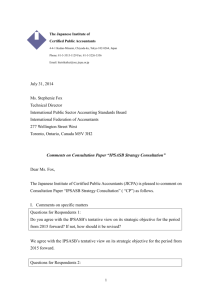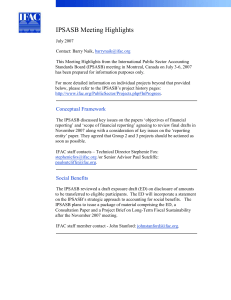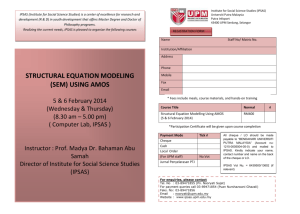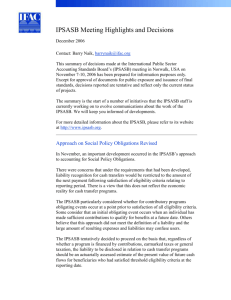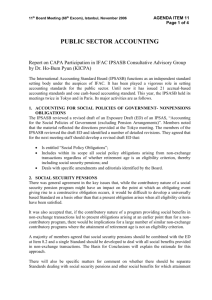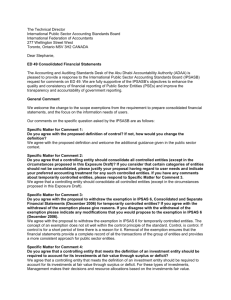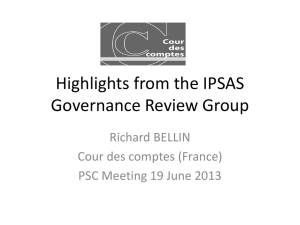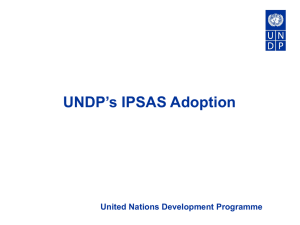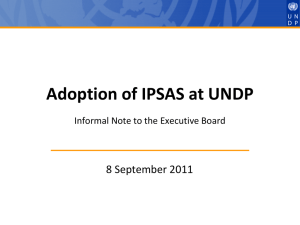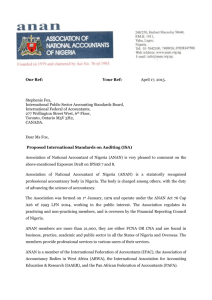Technical Manager, IPSASB
advertisement
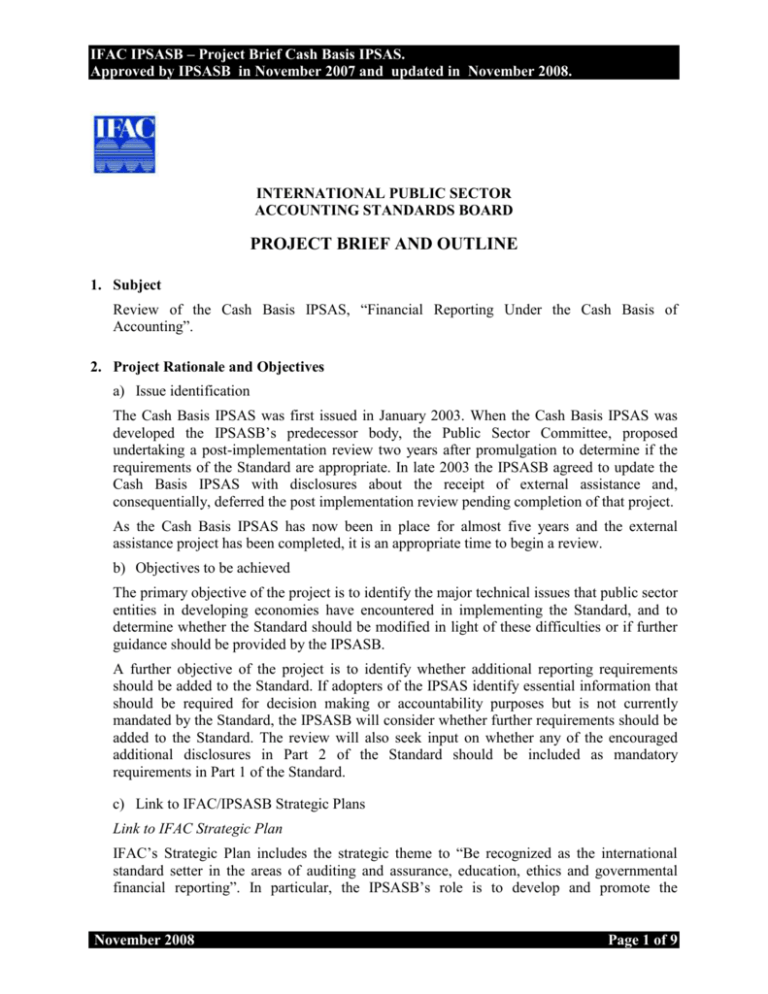
IFAC IPSASB – Project Brief Cash Basis IPSAS. Approved by IPSASB in November 2007 and updated in November 2008. INTERNATIONAL PUBLIC SECTOR ACCOUNTING STANDARDS BOARD PROJECT BRIEF AND OUTLINE 1. Subject Review of the Cash Basis IPSAS, “Financial Reporting Under the Cash Basis of Accounting”. 2. Project Rationale and Objectives a) Issue identification The Cash Basis IPSAS was first issued in January 2003. When the Cash Basis IPSAS was developed the IPSASB’s predecessor body, the Public Sector Committee, proposed undertaking a post-implementation review two years after promulgation to determine if the requirements of the Standard are appropriate. In late 2003 the IPSASB agreed to update the Cash Basis IPSAS with disclosures about the receipt of external assistance and, consequentially, deferred the post implementation review pending completion of that project. As the Cash Basis IPSAS has now been in place for almost five years and the external assistance project has been completed, it is an appropriate time to begin a review. b) Objectives to be achieved The primary objective of the project is to identify the major technical issues that public sector entities in developing economies have encountered in implementing the Standard, and to determine whether the Standard should be modified in light of these difficulties or if further guidance should be provided by the IPSASB. A further objective of the project is to identify whether additional reporting requirements should be added to the Standard. If adopters of the IPSAS identify essential information that should be required for decision making or accountability purposes but is not currently mandated by the Standard, the IPSASB will consider whether further requirements should be added to the Standard. The review will also seek input on whether any of the encouraged additional disclosures in Part 2 of the Standard should be included as mandatory requirements in Part 1 of the Standard. c) Link to IFAC/IPSASB Strategic Plans Link to IFAC Strategic Plan IFAC’s Strategic Plan includes the strategic theme to “Be recognized as the international standard setter in the areas of auditing and assurance, education, ethics and governmental financial reporting”. In particular, the IPSASB’s role is to develop and promote the November 2008 Page 1 of 9 IFAC IPSASB – Project Brief Cash Basis IPSAS. Approved by IPSASB in November 2007 and updated in November 2008. application of International Public Sector Accounting Standards, including the Cash Basis IPSAS. As the IPSASB is the sole developer of international financial reporting standards on the cash basis of accounting, it bears the responsibility to ensure that (a) the standard meets financial statement users’ needs, (b) is capable of being implemented by governments adopting the standard in jurisdictions with different political and institutional arrangements and financial reporting traditions, and (c) is a useful stepping stone to adoption of the accrual basis of accounting. As such, it is timely that the IPSASB undertake a post-implementation review of the standard. The IFAC strategic plan also includes the strategic theme “Sustainability of the profession”, which encompasses the development and growth of the accounting profession, particularly in areas where the profession is in the early stages of development. The Cash Basis IPSAS is an important tool for the profession in countries where public sector financial reporting is nonexistent or rudimentary. It is therefore important for the IPSASB to continue to develop the Cash Basis IPSAS for use by the profession in those countries that need to develop public sector financial reporting from a very low base. Link to IPSASB Strategy The IPSASB Strategy includes a commitment to undertake a review of the Cash Basis IPSAS in the light of implementation experiences. 3. Outline of the Project a) Project Scope The aim of the project is to determine how the Standard can be improved. The project is to identify public sector entities that have implemented or considered the implementation of the Cash Basis IPSAS, “Financial Reporting under the Cash Basis of Accounting” and, as appropriate, seek input on their implementation experiences. A Task Force is to be established to lead the data collection and analysis stages of the project – see section 6 below. The Task Force will also make recommendations to the IPSASB on whether the IPSAS should encourage or require any additional disclosures about financial instruments, and the nature of those disclosures. b) Major Problems and Key Issues to be Addressed in Generating the Implementation Experience Data Major problems that may arise include: Identifying the reporting basis used by the public sector in a given jurisdiction. The sources of information that will be used include the current IPSASB implementation survey, IFAC’s compliance program, the internet, World Bank ROSC reports and information obtained from other multi-lateral or bi-lateral development entities. Obtaining the cooperation of public sector entities in undertaking the analysis of the implementation of the Cash Basis IPSAS. As a result of conducting the implementation survey we now have an extensive database of government contacts in a number of countries that we will try to drawn upon. While the November 2008 Page 2 of 9 IFAC IPSASB – Project Brief Cash Basis IPSAS. Approved by IPSASB in November 2007 and updated in November 2008. IPSASB experienced considerable difficulty in field testing the requirements of the Cash Basis IPSAS and, more recently, the proposed Standard on External Assistance it is hoped that personal approaches to the target entities will have more success. 4. Describe the Implications for any Specific Persons or Groups a) Relationship to IASB There are no implications for the IPSASB’s relationship with the IASB as it does not develop cash basis financial reporting standards. b) Relationship to other projects in process, recently completed and planned Section 1.10 “Recipients of External Assistance” was issued as an addition to the Cash Basis IPSAS late 2007. The requirements of the section become effective for annual financial statements of periods beginning on or after 1 January 2009. While earlier application of section 1.10 is possible, it is likely that implementation experience will be limited at this time. The IPSASB is currently developing IPSASs based on IFRS 7 “Financial Instruments: Disclosure”; IAS 32 “Financial Instruments: Presentation” and IAS 39 “Financial Instruments: Recognition and Measurement” as part of its IFRS Convergence Program. The Task Force will need to be cognizant of the IPSASB’s deliberations on these matters in developing any recommendations about additional disclosures to be included in the IPSAS. c) Other This project has implications for the IPSASB’s relationship with the multi-lateral development banks (MDBs), which have a keen interest in seeing this IPSAS kept up to date. The MDB’s promote the adoption of the Cash Basis IPSAS in jurisdictions where there is currently little or no external financial reporting by public sector entities. These entities are keen to ensure that the Cash Basis IPSAS meets the needs of these entities and that it is capable of implementation in jurisdictions where accounting and bookkeeping skills may be scarce within public sector entities. The World Bank in particular has expressed keen interest in this project. 5. Development Process, Project Timetable and Project Output a) Development process The first step in the project is to endeavor to identify from various publicly available sources which of the developing economies (based on criteria used by the World Bank) have adopted or have considered adopting the Cash Basis IPSAS for financial reporting by the government or other public sector entities. The resources to be used include: IPSASB implementation survey results where applicable Internet sites of Ministries of Finance; World Bank ROSC reports; IFAC compliance program results; and November 2008 Page 3 of 9 IFAC IPSASB – Project Brief Cash Basis IPSAS. Approved by IPSASB in November 2007 and updated in November 2008. Other internet sources. Having identified public sector entities which have adopted or have considered adopting the Cash Basis IPSAS, a sample of these entities will be identified to approach in order to undertake a post implementation study to identify issues. Ideally, the selected entities will, reflect a range of geographical, language and accounting traditions. A survey questionnaire will be developed and circulated to these entities. The survey questionnaire will be translated into French and Spanish to facilitate responses from a wide range jurisdictions. Experience has shown that economies in transition are most likely to adopt the Cash Basis IPSAS as a first stage in reforming public sector financial management. To this end, the assistance of the Developing Nations Committee of IFAC may also be significant. However, the most effective way to ensure that entities assist in a post implementation study may be through personal interview of appropriate government officials and/or their support staff. An interview questionnaire will be developed to form the basis of discussion with a government official. Input from Task Force members, and their networks, will be critical in identifying the potential survey population and the jurisdictions and individuals to participate in the interview component of the project. Consideration will also be given to holding regional public hearings in areas where several jurisdictions adopt the Cash Basis IPSAS or the participation of IPSASB members, Task Force members and staff in regional conferences in those areas. b) Project timetable Task Target Completion Date Project Approved by IPSASB November 2007 Project commencement: establishment of Task Force and staff support November 2008 Accounting basis identification Selection of countries to survey and for interviews Distribute survey materials and undertake interviews Compile results of survey and interviews Task Force reports interim survey findings to IPSASB Task Force Final Report presented to IPSASB ED and revised IPSAS developed and/or other actions February 2009 March 2009 April - September 2009 October 2009 November 2009 February 2010 March – December 2010 c) Project output The output of this project will be a detailed report from the Task Force to the IPSASB identifying: November 2008 Page 4 of 9 IFAC IPSASB – Project Brief Cash Basis IPSAS. Approved by IPSASB in November 2007 and updated in November 2008. the results of the survey and the views of the public sector entities interviewed. This report will include any suggestions made by the public sector entities for improvements or modifications to the Cash Basis IPSAS. Task Force recommendations for modifications/improvements to the Standard, including recommendations on any additional disclosures about financial instruments. Subject to IPSASB decisions following review of the Task Force Report, an exposure draft proposing changes to the Cash Basis IPSAS will be developed and, after due process, a revised Cash Basis IPSAS will be developed. 6. Resources Required a) Task Force/subcommittee To lead and support project development a Task Force will be established with members drawn from the IPSASB, World Bank, regional multi-lateral development banks and development agencies. The IFAC Developing Nations Committee has contacts in many economies in transition that may prove useful in facilitating contact with entities implementing the Cash Basis IPSAS. Task Force members will be instrumental in providing information about the financial reporting practices of their constituents and/or in their client countries, and in facilitating contact with their client countries. The Task Force will be chaired by an IPSASB member selected by the IPSASB Chair and Technical Director. The Task Force will conduct its business primarily by electronic means but may meet at critical stages during project development. b) Staff One staff member will be required on this project for the period of the Task Force review (November 2008 – February 2010) and, subject to IPSASB decisions, to support development of an ED proposing any amendments to the IPSAS. Other staff will provide peer support and the Technical Director will supervise the project. 7. Important Sources of Information that Address the Matter being Proposed www.ifac.org/complianceprogram http://www.worldbank.org/ifa/rosc_cg.html IPSAS Implementation Survey Ministries of Finance websites. World Bank regional managers, and other multi-lateral development agencies, may be able to provide assistance in identifying public sector entities implementing the Cash Basis IPSAS. The International Organization of Supreme Audit Institutions –Sub-committee on Accounting and Reporting of the Professional Standards Committee – may also be able to assist. November 2008 Page 5 of 9 IFAC IPSASB – Project Brief Cash Basis IPSAS. Approved by IPSASB in November 2007 and updated in November 2008. 8. Factors that might add to complexity or length The major factor that could add to the length and complexity of the project is the success in obtaining cooperation from public sector entities implementing the Cash Basis IPSAS. Experience with trying to obtain cooperation of these entities in field testing the current Standard, as well as the External Assistance exposure draft, indicates that a personal approach is more likely to be successful. Whilst this is resource intensive from both financial and staffing perspectives, this may be the only way in which to obtain meaningful data. November 2008 Page 6 of 9 IFAC IPSASB – Project Brief Cash Basis IPSAS. Approved by IPSASB in November 2007 and updated in November 2008. Prepared by Matthew Bohun-Aponte Date December 12, 2007 (Technical Manager IPSASB) Updated by Paul Sutcliffe Date November 2008 (Consultant- Senior Advisor IFAC) The following should be completed after board or committee approval and after revising the project proposal form to reflect any changes by the board or committee. Approved by Date (Chair IPSASB) November 2008 Page 7 of 9 IFAC IPSASB – Project Brief Cash Basis IPSAS. Approved by IPSASB in November 2007 and updated in November 2008. COMMENTS BY TECHNICAL MANAGERS The comments of Technical Manager from each technical area are required before this Project Proposal is considered by the board or committee proposing to undertake the project. Technical Manager to the Compliance Advisory Panel [Insert comments (prompts – views on importance of project, other matters wished to be communicated)] Signed Date Technical Manager to the DNC [Insert comments (prompts – views on importance of project, other matters wished to be communicated)] Signed Date Technical Manager to the SMPC No comments Signed Paul Thompson Date November 12, 2007 Technical Manager to the IESBA No comments from Ethics on either of this project. Signed Jan Munro November 2008 Date 11/16/2007 Page 8 of 9 IFAC IPSASB – Project Brief Cash Basis IPSAS. Approved by IPSASB in November 2007 and updated in November 2008. Technical Manager to the IAASB It is proposed that the IPSASB also consider reaching public sector entities through Supreme Audit Institutions. The International Organization of Supreme Audit Institutions – in particular the Sub-committee on Accounting and Reporting of the Professional Standards Committee – may be able to assist in this regard. Signed Alta Prinsloo Date November 20, 2007 Technical Manager to the PAIB Committee [Insert comments (prompts – views on importance of project, other matters wished to be communicated)] Signed Date Technical Manager to the IAESB At this point I see no direct impact on the Education Board’s work. Signed DAVID MCPEAK Date November 27, 2007 Technical Manager to the Transnational Auditors Committee [Insert comments (prompts – views on importance of project, other matters wished to be communicated)] Signed November 2008 Date Page 9 of 9
